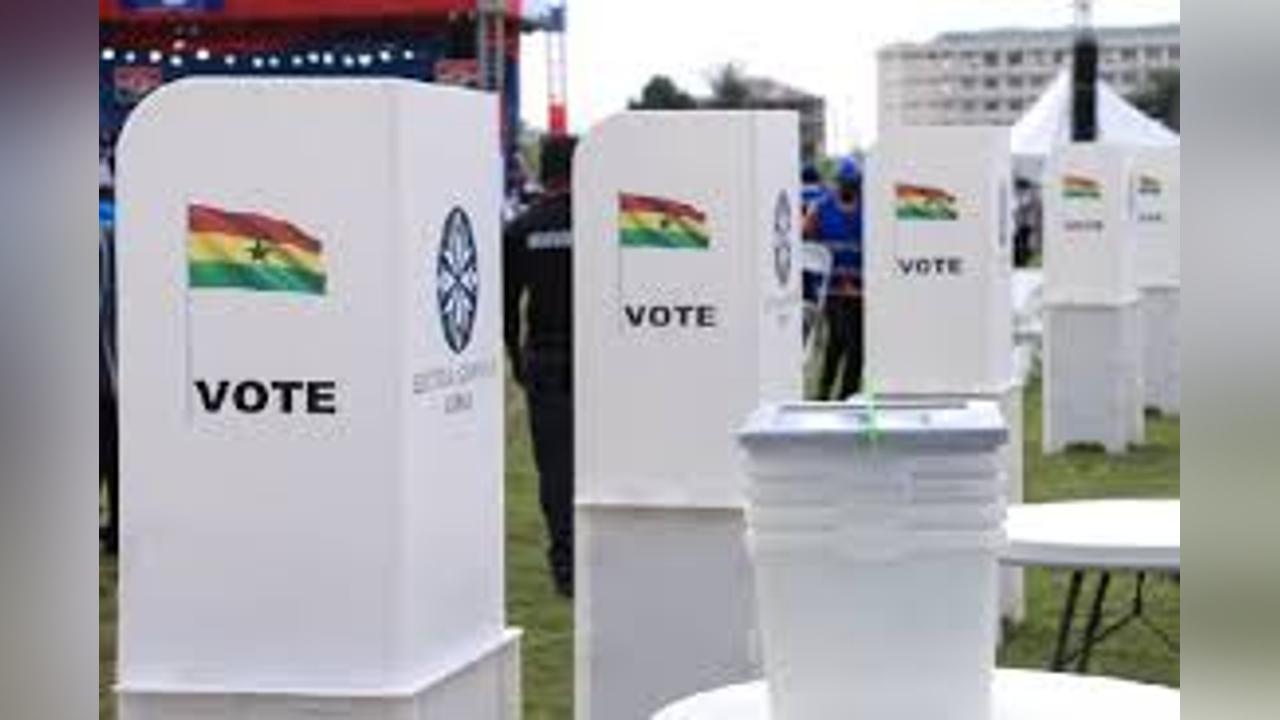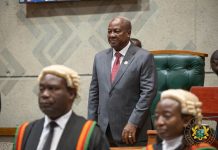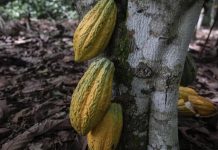Africa-Press – Ghana. Conducted by Info Research and Assessment UK Limited from October 27 to November 3, 2022, the research sampled the opinion of 254,757 persons in all the 16 regions of the country.
It was a face-to-face research work and the respondents were requested to answer certain questions. The polling company presented the margin of error of the research as +/-2 per cent.
On the question on who respondents would vote for if the elections were held on the day of the polling and former President John Mahama and Vice-President Mahamadu Bawumia decided to contest, 46 percent of the respondents decided to vote for Dr Bawumia, while 35% chose Mr Mahama.
Nineteen per cent said they would not vote at all because both the New Patriotic Party (NPP) and the National Democratic Congress (NDC) were the same.
On the economic crisis and difficulties Ghanaians were going through, the respondents were asked: “Do you think Ghana has been affected by COVID-19, the war in Ukraine and that these are the reasons for the current economic hardship?’’
Of the total respondents, 52 per cent answered, “Yes”, and 45 per cent, “No”. Two per cent answered “Not sure”. On what factors they would consider to vote in future elections, the respondents were asked: “If elections are held today, what issues will you consider as your basis to vote?”
Of the 254,757 respondents, 33 per cent answered, “Corruption”; 31 per cent said, “The economy” and 31 percent chose, “SHS”. Some 4.5 per cent selected, “Other factors”.
Views were sampled on the recent “fellow Ghanaians” address to the nation by President Akufo- Addo on the state of the Ghanaian economy. They were asked: “Were you inspired by the recent speech of President Akufo-Addo on the economy?”
Of those polled, 47 per cent said, “Yes”; 45 per cent responded, “No”, and eight per cent said, “Not sure”. The research work was sponsored by Daily Mail Ghana online.
The polling agent used a large sample that was chosen from all 16 regions of Ghana. Results of the polls suggested that if Mr Mahama, the former President, and Dr Bawumia, current Vice President, contested, it was Dr Bawumia who would win.
Both are leading prospective presidential candidates for the December 7, 2024 elections and are yet to decide if they will contest. Mr Mahama has decided to wait until the first quarter of 2023 before deciding.
Dr Bawumia is also waiting for his party, the NPP, to open nominations. That is likely to happen in the middle of, or late 2023. What is of particular interest to this article is the question on the causes of the current economic and financial crisis in the world and in Ghana.
For the first time, results of an opinion sampling indicated that majority of Ghanaians recognised the fact that the COVID-19 pandemic, Russia’s evasion of Ukraine and high oil and food prices caused by that war were the reasons for the economic hardships Ghanaians were experiencing.
Results of the research in this area showed that majority of the 254,757 respondents were knowledgeable, well informed and not swayed by party-political influence and mass and social media misinformation and disinformation.
It also means that they might have been exposed to mass and social media misinformation and disinformation, but the majority of the respondents had high Intelligent Quotient (IQ) rates.
The question on the causes of the economic hardships in Ghana appears to have served as an IQ test. It sought to measure the level of knowledge of Ghanaians on current international affairs and how that impacted Ghana politically and economically.
IQ questions seek to measure the intelligence of persons about certain issues. Intelligent Quotient is defined as “a total score derived from a set of standard test or sub-test designed to assess human intelligence”.
IQ is also defined as “a number representing a person’s reasoning ability (measured using problem-solving tests)”. There is also the age-old method of measuring intelligence by observing a person’s behaviour outside the testing room.
Those respondents who scored low rate of IQ on the question about causes of the economic hardships in Ghana need to improve their knowledge about international affairs and how they affect Ghana’s political and economic development.
Both developed and developing countries are dependent on the global market, where goods and services are offered for sale. The forces of supply and demand determine the prices at which commodities and services are sold and paid for.
Natural or artificial shortages could drive prices up, and a glut could pull prices down. The global money market is also influenced by certain factors such as prevailing interest rates in wealthy countries, those countries’ level of inflation and economic growth.
For example, the United States has recently increased its interest rates a number of times. That was not done for the fun of it. High inflation figures in the US, caused by high food and energy prices, compelled the American treasury to raise interest rates up to contain high inflation.
Impact of the interest rates increases in the US can negatively affect the economy of both rich and poor countries, because the dollar is a standard or convertible currency.
Increases in the value of the dollar can raise the cost of borrowing on the global market. It can also increase the cost of imported goods and services.
The good news for developing countries is that it raises the value of exported commodities. Countries that export more raw materials and finished products will benefit, while countries that import more have to pay more money in dollars.
High US interest rates can also reduce the value of a country’s currency, such as the Ghana Cedi. When that happens, it means the country has to pay more for imported items such as petrol and essential commodities (wheat, rice, cooking oil and sugar).
Besides the war in Ukraine and the COVID-19 pandemic, high value of the US dollar is one of the causes of economic hardship in Ghana. That is why it is prudent for Ghana to add value to its primary products such as cocoa, timber, gold, diamond, bauxite, fruits and others.
To conserve scarce foreign currency, Ghanaians must develop taste for locally-produced goods and depend less on imported food items. If Ghana truly wants to put itself on the path of economic development, the country must push for uplift from the launch-pad stage of subsistence agriculture to large-scale farming, accompanied by big commercial activities and an industrial revolution.
Lift-off from the take-off stage entails pulling out a significant number of the labour force from the agricultural to the industrial and service sectors through value-adding process and creative and not cosmetic education.
However, the Ghanaian dream rests on the two-wheeled-political-party chariot, one leg of which is mandated every four years to rule and take the country to the dream island of economic development.
Ghana cannot fulfil that dream when the country is obviously divided against itself on partisan grounds. History has shown that in time of war, political parties put aside differences and prosecute the war in a united front.
Containing an economic crisis that can destroy economic gains already made and put Ghanaians in hardships, as at present, is like waging a war. It is not the time for one of the parties to initiate a “political draught game” geared at weakening performance of the party in power for future electoral gains. Ghanaian politicians must put interests of the nation first, especially in times of war, before the quest for political influence and gains.
For More News And Analysis About Ghana Follow Africa-Press







